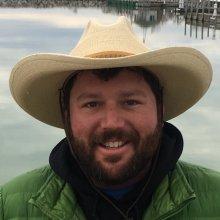
Travis Smith
Tell us about your work/research. What kinds of things do you do?
I am one of five captains for NOAA’s Great Lakes Research Fleet. Most of the work I do is based out of Alpena MI aboard the RV Storm or one of our 55-foot buoy tender vessels. I have been in the marine world since junior high when I was a deckhand on charter salmon boats and have run or worked on tug boats, head boats, crew boats, dive charter vessels, dredges, etc. Throughout these endeavors, I have been able to work along most of the east coast and Gulf coasts. I spent a few years as a project engineer for Weeks Marine Survey department before taking this position with NOAA. Glad to be back home working on the Great Lakes with an amazing team of people.
What sparked your initial interest in your career?
My interest in messing about in boats started at a very young age. At six years old I had a canoe stashed on Spring Lake and every awake minute of that summer was spent aboard the SS Discovery, the name of my canoe, fishing and catching turtles... At 7 I owned my first sailboat a butterfly and started racing at the local yacht club. At 12 I owned my first powerboat a 13 Boston Whaler and from a very early age, I wanted to make a career out of being on the water. Thankful that today I still love being on the water and glad that experiences have led to my current position.
Who influenced you or encouraged you the most?
My dad was a waterman and some of my earliest memories revolve around being out with him salmon fishing or watching him ski a slalom course. Vacations and most leisure time centers around a lake, ocean, river, or boat. My father, besides a short-lived period as a pro waterskier never made this passion his career. I think he regretted that and he always encouraged me to seek out my passion for a career.
What element of your work/study do you think is the most fascinating?
Being the captain on the RV Storm I get to experience many fascinating projects from shipwreck archeological studies and discovery to sinkhole bacterial research. I think what is truly fascinating in my position is the diversity of projects I have been involved in with NOAA. Projects include algae bloom research in Lake Erie, surveys for WWII era trainer aircraft, shipwreck research, weather buoy deployments, DOD targets set and cleanup, mussel research and more. Glad for my small part on all these projects and that every day is unique.
What other jobs led you to your current career?
Many jobs aboard different vessels including charter boats, dredges, workboats, survey vessels, research vessels, and crew boats.
What are your degrees and certifications?
Associates degree Applied Science/Marine Technology
Master Captain License
What are your hobbies?
Most of my time away from work is still spent on the water. I love snorkeling and exploring the sanctuary in my 17 Boston Whaler Newport; I fish as much as possible and probably my favorite is chasing brook trout on small creeks with a fly rod; I really enjoy camping and hiking; hunting for morels; Nordic Skiing; eating tacos; hacking at my guitar; sleeping
How did you get involved with the TBNMS project with OET?
Alpena is my duty station and the Storm is my primary vessel. Just lucky I guess...
What advice would you give someone who wants to have a career like yours?
I would strongly encourage them to go to CFCC and enter the Marine Technology course. Although I had worked as a captain many years before this degree opened so many doors and the knowledge gained was incredible. A large portion of each semester is spent at sea aboard the Cape Hatteras, a UNOLS Vessel. Students will experience everything from biological sampling survey to all types of hydrographic instrumentation and be able to practically use it in the field. Also, very good boat handling course that’s a complete semester along with a whole semester of navigation and marlinspike seamanship. I think it is one of the best courses out there for captains aboard research vessels or field engineers for almost any marine application. 95 percent of graduates get jobs in the field.
